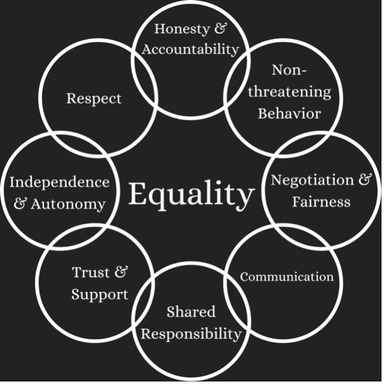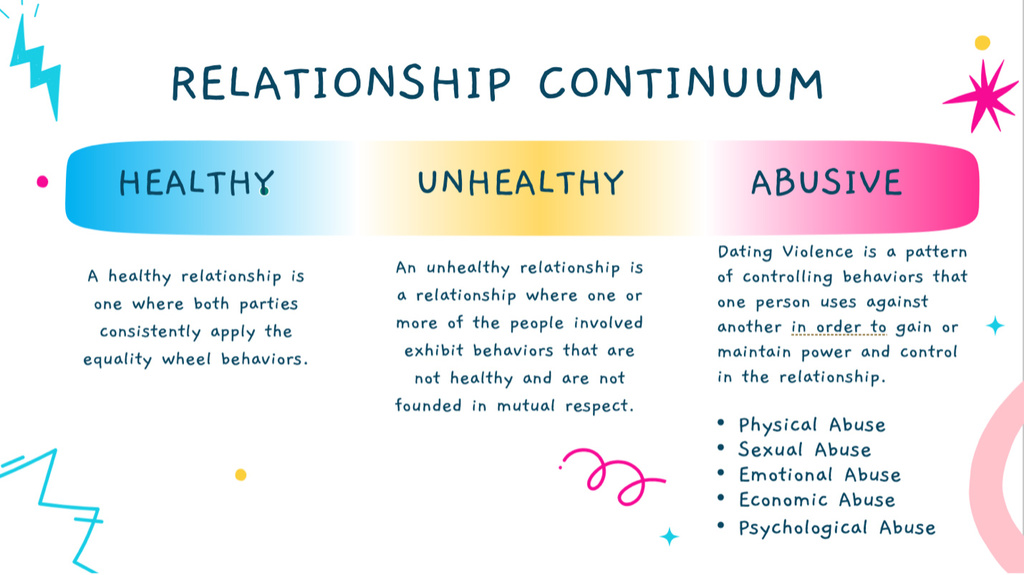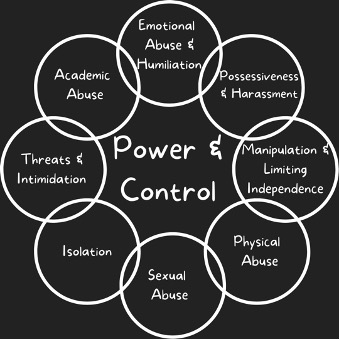What Makes a Relationship Healthy or Unhealthy?
Wheel of Equality and Relationship Continuum
The wheel of equality is a tool that shows behaviors and dynamics we need to actively practice for our relationships to remain healthy. If we are in a healthy relationship, we need to be proactively looking for opportunities to incorporate these behaviors more. A relationship is not just healthy or unhealthy, it’s a continuum, and we always want to be moving towards more health.

In an unhealthy relationship, the behaviors shown on the wheel of equality are lacking. Some examples of unhealthy or worrisome relationship behaviors might be disrespecting someone’s independence by insisting that you’re with them in every social situation, or not supporting someone’s pursuit of their professional goals, or shifting blame universally to one person whenever conflict arises. Sometimes these behaviors stand alone, and other times they can build into abuse.

Abusive relationships can look different depending on what forms of harm are involved, but they are all built on a dynamic of consistent unequal power that keeps one person isolated, scared, and confused. Abusive relationships can entail physical and sexual harm, but they can also entail emotional, economic, or psychological abuse. If you recognize some of the examples of abuse within your own relationship(s), you may want to reach out to someone for help, and we'll provide resources below to get help.
Power and Control Wheel
The power and control wheel shows behaviors an abusive partner may use to gain and maintain power and control over someone else. If your relationship consistently makes you feel disrespected, unhappy, and unsafe you might be experiencing the dynamics listed in the power and control wheel, and it is never okay for your partner to harm you and you never deserve harm.

Resources
If you or someone you know is in need of support, don’t hesitate to contact one of the free, confidential resources below:
If you selected...
Mostly Yes
It seems you have a happy and healthy relationship! It’s important to continue monitoring your own relationship and finding areas to continue positive growth. It is important that we continue to model healthy relationship behaviors to others. If you or others need support in a relationship, here are some resources you can utilize and share.
Planned Parenthood
Ideas on how to keep your relationship going strong!
https://www.plannedparenthood.org/learn/relationships/healthy-relationships
Mostly Maybe
It seems like your relationship is mostly safe, but you’re not always feeling happy and respected. We all deserve to feel cared for and appreciated in our relationships. You and others involved in the relationship might want to explore how to strengthen your relationship by incorporating more healthy, respectful behaviors, or for the health and happiness of all involved, you might decide that separation or setting some boundaries is the best next step. Below are some resources that you can check out to talk with others about your concerns and to learn more about healthy relationship behaviors.
Love is Respect
Learn more about what makes relationships unhealthy vs. healthy:
https://loveisrespect.org/relationship-spectrum
Rape Victims & Advocacy (RVAP)
24-hour Hotline: 319-335-6000
website - https://rvap.uiowa.edu
Domestic Violence Intervention Program (DVIP)
24-hour Hotline: 800-373-1043
Website - https://dvipiowa.org/
Mostly No
It seems like you’re mostly feeling unhappy and unsafe in your relationship. We all deserve to feel happy and safe in our relationships with others, and we never deserve to be harmed. Here are some resources and services that can offer support and help you think about your next steps towards safety.
Love is Respect
Learn more about dynamics of unsafe relationships:
https://loveisrespect.org/power-control
Domestic Violence Intervention Program (DVIP)
24-hour Hotline: 800-373-1043
Website - https://dvipiowa.org